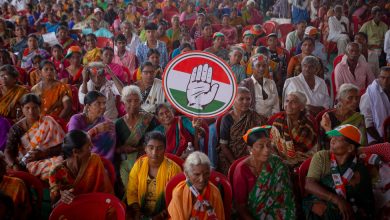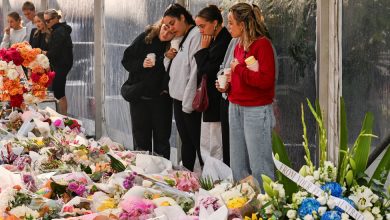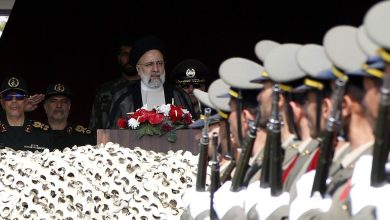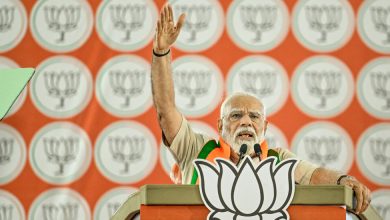Your Tuesday Briefing


A damaged school in Kharkiv, Ukraine.Credit…Sergey Bobok/Agence France-Presse — Getty Images
Civilians killed in a deadly assault
The first talks between Ukraine and Russia aimed at halting the Russian invasion were eclipsed yesterday by a deadly Russian rocket assault on Kharkiv, Ukraine’s second-largest city, that killed at least nine civilians and injured dozens of others. Volodymyr Zelensky, the Ukrainian president, denounced it as a war crime.
The bombardment of a residential area of Kharkiv, which may have included cluster munitions that most nations have agreed to ban, has raised new alarms about how far the Kremlin may go to subjugate its smaller neighbor. Follow the latest updates.
Neither Russia nor Ukraine are members of the treaty that bans cluster munitions, which are lethal bomblets dispersed in midair over a wide area, hitting military targets and civilians alike. But their use might well signify a new — and bloodier — chapter in the battle for Ukraine.
As the talks ended with little more than an agreement to meet again, the bombardment signaled a potential turn in the biggest military mobilization in Europe since World War II. Russia has met unexpectedly stiff resistance by Ukrainians and strong condemnation from much of the world.
Effects on Russia: Sanctions are battering the Russian economy, causing the ruble to plunge and foreign investors to shed holdings in Russian companies. At the same time, grass-roots gestures of boycotts or cancellations around the world carry a potent symbolic punch.
Refugees: About 500,000 people have fled Ukraine in recent days to escape Russian attacks. For many people trying to leave, the trip to the border is long and tiring. Limited transportation options and freezing temperatures often exacerbate an already difficult journey.
More news on the conflict:
-
Global sports executives moved to banish Russians from competitions and deepen the country’s isolation for its invasion of Ukraine.
-
After years of discussions about the need for public-private partnerships to combat destructive cyberattacks, the war in Ukraine is stress-testing the system.
A U.N. study of climate dangers
The dangers of climate change are mounting so rapidly that they could soon overwhelm the ability of both nature and humanity to adapt unless greenhouse gas emissions are quickly reduced, according to a major new scientific report released by the Intergovernmental Panel on Climate Change yesterday.
Written by 270 researchers from 67 countries, the report warns that if average warming passes 1.5 degrees Celsius, even humanity’s best efforts to adapt may falter. Many leaders, including President Biden, have vowed to limit total global warming to no more than 1.5 degrees Celsius compared with preindustrial levels, but achieving that goal would require nations to all but eliminate their fossil-fuel emissions by 2050. Most are far off-track.
Efforts to invest in adaptation measures like flood barriers to limit damage, the researchers found, are often too “incremental,” and future threats will require “transformational” changes in how we live. The report also carries a stark warning: If temperatures keep rising, more and more people will suffer unavoidable loss or be forced to flee their homes, creating dislocation on a global scale.
Impact: Few nations will escape unscathed. Blistering heat waves made worse by global warming have killed hundreds in the U.S. and Canada, ferocious floods have devastated Germany and China, and wildfires have raged out of control in Australia and Russia.
Court case: Members of the U.S. Supreme Court’s conservative majority voiced skepticism that Congress had authorized the E.P.A. to decide what they said were major political and economic questions.
In Germany, Covid protesters and far right merge
A protest movement against Covid-19 measures that has mobilized tens of thousands across Germany is increasingly fusing with the far right, each finding new purpose and energy and further radicalizing the other. The merging of the movements has taken a sinister turn as politicians have faced death threats and protests outside their homes, alarming security agencies.
What began with demonstrations against government policies has become personal. The number of attacks on politicians tripled last year to 4,458, according to the police. Officials worry that far-right militants want to use the pandemic to unleash another wave of political violence.
The debate about Covid restrictions has energized a far-right scene that thrives on a sense of crisis and apocalypse. The messaging is eerily familiar to that used to condemn an influx of refugees and Europe’s debt crisis: The state is failing, democracy is subverted by shady “globalists” and the people are urged to resist.
The radicalization of protesters against Covid measures is most visible in the former Communist East, where far-right extremists now dominate the organization of the protests.
Context: While the government is preparing to lift coronavirus restrictions, Olaf Scholz, the German chancellor, is determined to turn a general vaccine mandate into law.
Global movement: On the streets of Dresden one recent Monday, the signs and slogans — “Freedom,” “Democracy” and “The Great Resist” — were nearly identical to those on the streets of Ottawa, Canada, where a protest started by truckers prompted the government to declare a state of emergency.
Here are the latest updates and maps of the pandemic.
In other developments:
-
Wales and Scotland moved to relax some pandemic restrictions.
-
While protection against hospitalization is strong, Pfizer-BioNTech’s Covid-19 vaccine offered almost no protection against infection for children 5 to 11, even just a month after full vaccination.
-
Hong Kong’s biggest Covid outbreak of the pandemic is overloading its health system.
THE LATEST NEWS
Other Big Stories
-
President Biden will use his first State of the Union address today to claim credit for a robust economy and a unified global response to Russia’s invasion of Ukraine, even as he acknowledges the pain of inflation, administration officials said.
-
Europe has enough energy to get through the winter, but the Russian invasion of Ukraine has exposed vulnerabilities that need to be addressed, according to a top E.U. official.
-
A court has given the Congolese control of one of the world’s largest sources of cobalt while allegations against the mine’s Chinese owners are investigated.
Around the World
-
More than 120,000 people were airlifted out of Afghanistan in August, most with just a few hours to gather their belongings. Here are some of the keepsakes they chose.
-
Imran Khan, the prime minister of Pakistan, said that he was slashing fuel and electricity prices to help offset rising global energy prices because of the war in Ukraine.
-
Singapore’s Supreme Court declined to overturn a colonial-era law criminalizing gay sex, saying that because it was not enforced, the legal challenges did not stand.
What Else Is Happening
-
The city of Amsterdam returned a painting by the Russian artist Wassily Kandinsky to heirs of a Jewish couple who had sold it as they tried to escape the Netherlands during World War II.
-
Estée Lauder said that it had asked John Demsey, a top executive, to leave the company after he posted a meme containing a racial slur on his Instagram account.
-
The movie “CODA” and the actors Jessica Chastain and Will Smith took top prizes at the SAG Awards, often considered a precursor to the Oscars.
A Morning Read
The best-kept vintage secret in Paris is a boutique on the Left Bank that, at slightly less than 100 square feet, makes shopping a one-to-one experience by default.
“It’s like attending a chapel run by a crazily dressed high priestess of vintage,” the interior designer Nate Berkus said of the store. “It’s always this storied, layered experience, and you leave with a treasure every time.”
ARTS AND IDEAS
Return to office wear
When both Alessandro Michele of Gucci and Donatella Versace (not to mention Dolce & Gabbana and Ambush) open their shows with a suit — dark, tailored, slightly oversize — something clearly is going on. And it’s a far cry from the predicted shift, thanks to the pandemic, to elastic waists, leggings and flats.
But then, the world is not such a comforting place at the moment.
“For the last few weeks I have felt myself getting very serious,” said Walter Chiapponi of Tod’s, who also began “his no-nonsense show of plush tailoring with a somber, single-breasted dark pantsuit under a dark overcoat,” The Times chief fashion critic, Vanessa Friedman, writes.
“The suit began its runway re-emergence in New York last week, and it now appears to be reaching critical mass,” she writes, adding that a suit “that makes you feel immediately girded for the day may be the garment best, well, suited for the times.”
Also in fashion: In Manhattan, a showroom highlights six designers with roots and family in Ukraine.
PLAY, WATCH, EAT
What to Cook
These soy-glazed salmon hand rolls are a great way to use up leftover grains.
Virtual Travel
In search of Panama’s elusive spider monkeys.
What to Read
In Jane Pek’s debut novel, “The Verifiers,” a sleuth starts researching digital Casanovas and finds herself involved in a possible murder.
Now Time to Play
Here’s today’s Mini Crossword, and a clue: Circle dance at a Jewish wedding (four letters).
Here’s today’s Wordle and the Spelling Bee.
You can find all our puzzles here.
That’s it for today’s briefing. Thanks for joining me. — Natasha
P.S. The word “lumpsucker” — a three-inch fish with suction cups and toothy scales — recently appeared for the first time in The Times.
The latest episode of “The Daily” is about the battle for Kyiv.
Melina Delkic wrote today’s Arts and Ideas. You can reach Natasha and the team at [email protected].




